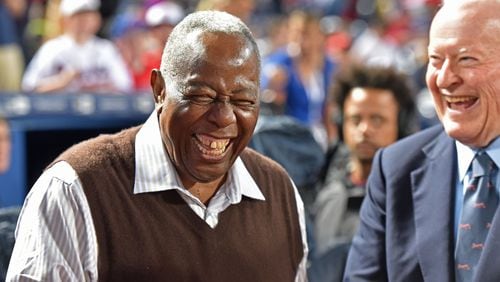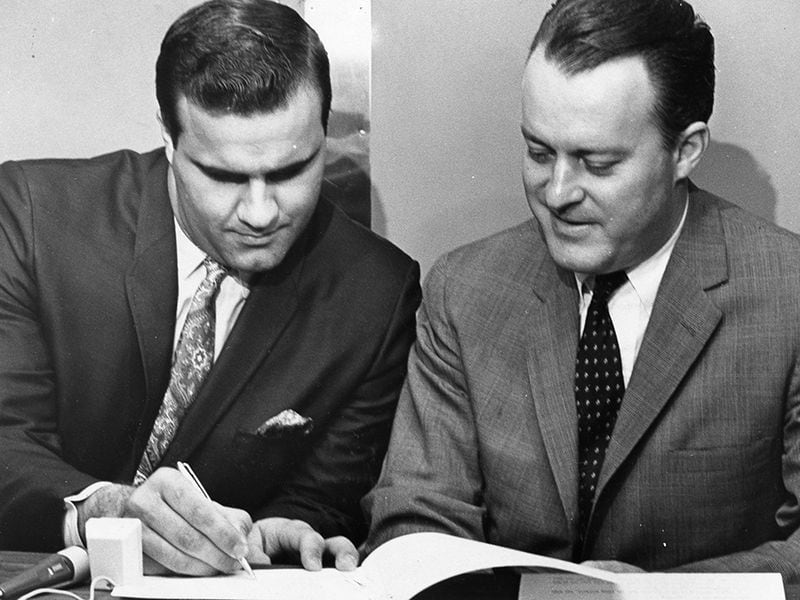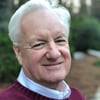ABOUT THIS SERIES
This interview with former Braves owner Bill Bartholomay starts a series of AJC stories marking a half-century of major-league sports in Atlanta.
Also today: Fifty people who have made huge impacts on Atlanta's major-league sports history.
Monday: Fifty years. One championship. How Atlanta's shortage of championships compares to other cities.
Tuesday: The Braves' and Falcons' strategies in marketing their 50th seasons here, and how fans react.
As the Braves complete their 50th season in Atlanta, the man who brought them here remains actively engaged with the team.
In fact, just within the past month, former owner Bill Bartholomay twice came to Atlanta to watch the Braves play, attended a ceremony at the SunTrust Park construction site and, on his 87th birthday, helped represent the franchise at MLB owners’ meetings in his hometown of Chicago.
“Baseball has been a great part of my life,” Bartholomay said recently. “I was an honorary Cubs bat boy when I was 9 years old. I’m as enthusiastic now as I was then.”
Credit: AJC File
Credit: AJC File
No one has experienced the full range of Atlanta’s major-league sports timeline, from start until today, at a higher level than Bartholomay. So it seems fitting in these fading weeks of the Braves’ 50th season here to revisit the team’s Atlanta history with the man who started it.
As a young Chicago insurance executive, Bartholomay was the leader of a group that bought the Milwaukee Braves for $6.2 million in 1962, decided in 1964 to move the franchise to Atlanta and weathered Wisconsin court battles to make it happen in 1966. He lived in Atlanta apartments, first downtown and then in Buckhead, during the team's early seasons here. He lifted Hank Aaron's mother over the barrier at the front of the owner's box so she could meet her son at home plate after Aaron broke Babe Ruth's career home-run record on April 8, 1974.
Bartholomay sold the Braves to Ted Turner for $11 million in 1976, partly because some of his partners' enthusiasm for their investment had waned. But throughout Turner's ownership and then Time Warner's and now Liberty Media's, Bartholomay has remained a prominent part of the organization — chairman of the board of directors until 2003 and chairman emeritus since then.
His input has been sought by Braves owners and executives, as well as by baseball commissioners, through the decades. In recent years, he chaired MLB’s ownership committee and served on its executive council. He has known all ten baseball commissioners, starting with Kenesaw Mountain Landis, whom Bartholomay met as a kid.
Retelling the story of how major-league sports came to Atlanta — the Braves arrived first, followed five months later by the Falcons and 2 1/2 years later by the Hawks — Bartholomay begins at the MLB All-Star Game in Cleveland on July 9, 1963.
Atlanta sent a delegation, led by Mayor Ivan Allen Jr. and backed by banker Mills B. Lane Jr., to the All-Star festivities to make sure baseball understood that the city wanted a team and would have a new 50,000-seat stadium ready for it.
“They made it very clear that the stadium was going to be completed, with or without a tenant,” Bartholomay recalled. “Atlanta was going to take the lead in a lot of things — the new economy and the new South and whatnot — and part of that was professional sports, baseball and football. … To make about a $20 million commitment to build a stadium on spec with no team involved was pretty gutsy, to say the least.
“The two teams that had leases that were about to run out at the time were our team and the Indians. Atlanta made it perfectly clear to me that given a preference, they wanted a National League team. The Braves seemed to be the logical one. We took it seriously.”
In Milwaukee, the Braves’ attendance had fallen precipitously from its highs of the late 1950s.
“With the Chicago teams 89 miles away (to the south), no fans in Lake Michigan (to the east) and the Twins’ move into Minneapolis eliminating a lot of our fan base from western Wisconsin, we were getting boxed in,” Bartholomay said.
In Atlanta, he saw a growing and untapped market that could draw fans and TV/radio revenue from multiple states.
In October 1964, the Braves’ board of directors voted 12-6 to move the team to Atlanta. Ernie Johnson, then the team’s publicity director and later its beloved broadcaster, announced the news to reporters in Chicago. National League owners unanimously approved the move, although the lease and legal challenge kept the Braves in Milwaukee through the 1965 season.
“Frankly, we thought it was a very great opportunity for baseball, 100 years after Reconstruction, to kind of lead professional sports on a regular-season basis into the southeastern part of the United States,” Bartholomay said. “And … I think (major-league sports) helped make Atlanta what it is today.”
Bartholomay recalled that among the complexities he had to work through was a deal with Earl Mann, owner of the Atlanta Crackers minor-league team.
“He was entitled to some compensation for the territory,” Bartholomay said. “Earl thought $250,000 was about the right number. I thought it would be a little less than that. We went back and forth for a long time … and finally settled on $200,000. He said you could pay it over two years.”
That’s equivalent to about $1.5 million today.
Another issue, Bartholomay recalled, was whether to put a roof on Atlanta’s stadium, which was being built at the same time as Houston’s Astrodome.
“It was speculated a roof would cost around $4 million,” he said. “I didn’t think it was that important in Atlanta and I still don’t. Rain delays are part of the game.”
And then there was the matter of the team’s final days in Milwaukee. Understandably unpopular there, Bartholomay had made a public commitment to attend all remaining home games if the Braves were in contention on Labor Day 1965, which they were.
“It was not the happiest experience because there was an awful lot of anger up there,” he said. “But just being there, they could focus the anger on me and not take it out on the players.”
Finally, on April 12, 1966, big-league sports arrived in Atlanta when the Braves played their first regular-season game here. They lost 3-2 to the Pittsburgh Pirates before 50,671 fans.
“I remember a lot of things about that night,” said Bartholomay, who was 37 at the time. “Joe Torre hit two home runs and scored both our runs. The game went 13 innings and (manager) Bobby Bragan left Tony Cloninger in for the whole game. I don’t think he was ever the same after that from a pitching standpoint.
“We tragically lost the game, but it was a fantastic night.”
Bartholomay has lived a lot of Braves history since then.
He recalls the excitement when the Braves reached the inaugural National League Championship Series in 1969, losing to the Miracle Mets. He calls Aaron’s 715th career home run in 1974 “a momentous night for me and all of us who were there … a happy story at a time when things weren’t going so well in America.” He still frets a fifth-inning rain-out that wasted a lead with Phil Niekro on the mound in the opener of the 1982 NLCS against the Cardinals.
He savors the Doyle Alexander-for-John Smoltz trade in 1987: “I count my blessings every day for Doyle Alexander, because (otherwise) we never would have had Smoltzie.” And of course, he revels in the 1990s, when the Braves reached the World Series five times and won it once.
“When things got good, they got really good,” Bartholomay said.
He thinks they’ll get good again soon, even as a massive rebuilding process has resulted in the team’s worst season in 25 years.
“You suffer with these guys, lose a lot of tough games,” he said, “but we’re doing the right thing.”
He supports the 2017 move to Cobb County's SunTrust Park, which will be the Braves' third stadium since he brought them here.
Atlanta-Fulton County Stadium, designed to accommodate baseball and football, “wasn’t perfect for either one, but it had a charm about it. I liked it a lot,” Bartholomay said. Turner Field “has been good,” he said, but SunTrust Park “is going to be even better. I know it’s outside the city limits, but not by far.
“We’ll see, but I think it’s going to be a very popular destination.”
He has seen it all.
About the Author








